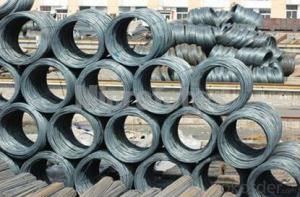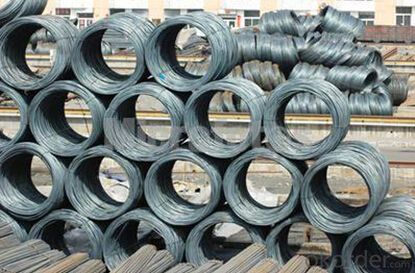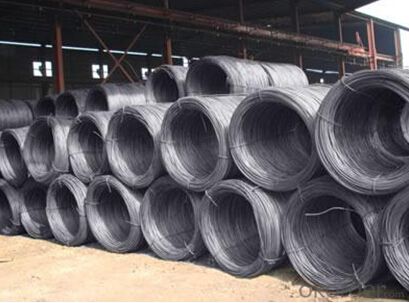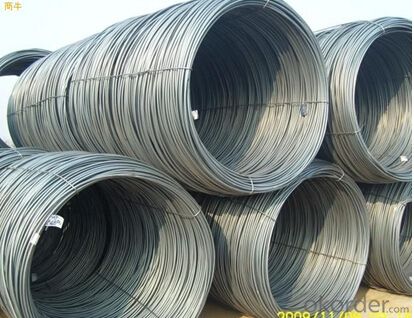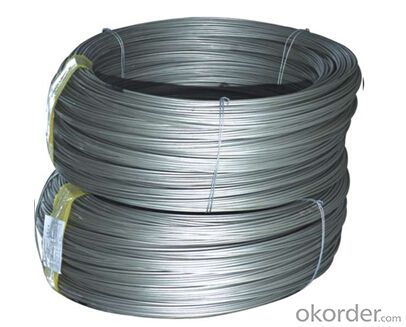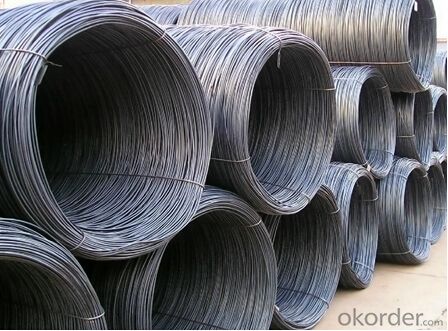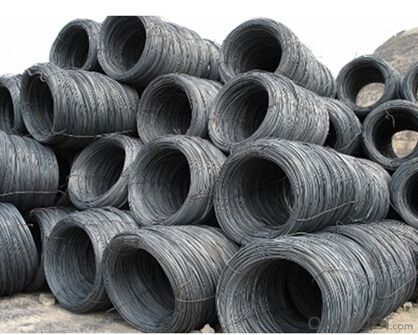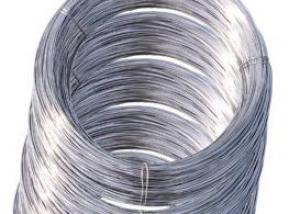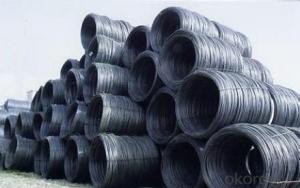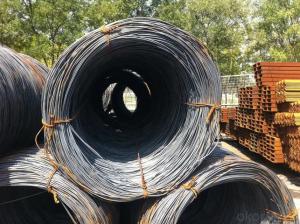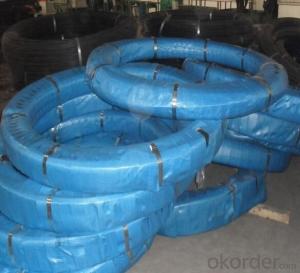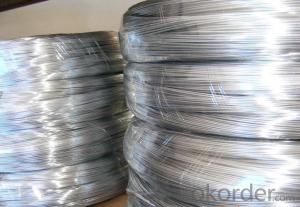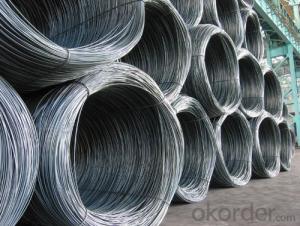Diameter 10mm AISI 304 Stainless Steel Wire Rod
- Loading Port:
- Tianjin
- Payment Terms:
- TT OR LC
- Min Order Qty:
- 1 m.t.
- Supply Capability:
- 10000 m.t./month
OKorder Service Pledge
Quality Product, Order Online Tracking, Timely Delivery
OKorder Financial Service
Credit Rating, Credit Services, Credit Purchasing
You Might Also Like
Specification
Type:
Carbon Steel,Spring Steel,Bearing Steel,Gear Steel,Deformed Steel,Stainless Steel,Alloy Steel
Shape:
Steel Coil,Steel Sheet,Steel Wire Rod,Steel Flat Bar,Steel Square Bar,Steel Angle,Steel Round Bar,Steel Billets
Technique:
Hot Rolled,Cold Rolled,Cold Drawn,ERW,Forged,Saw,Extruded,EFW,Spring
Surface Treatment:
Galvanized,Coated,Copper Coated,Color Coated,Oiled,Dry,Chromed Passivation,Polished,Bright,Black,PVDF Coated
Certification:
ISO,SGS,BV,IBR,RoHS,CE,API,BSI,UL
Thickness:
5.5mm--10mm
Width:
5.5mm--10mm
Length:
In coils
Outer Diameter:
5.5mm--10mm
Net Weight:
2m.t.
Packaging:
Seaworthy packaging
Diameter 10mm AISI 304 Stainless Steel Wire Rod
Detailed Information of the Diameter 10mm AISI 304 Stainless Steel Wire Rod
| Name | Hot Rolled High Carbon Wire Rod |
| Shape | Round Bar/Square Bar/Flat Bar/Plate/Wire |
| Standard | GB/ASTM/SAE/AISI/DIN/JIS/EN/BS |
| Surface Treatment: | Black/Peeling/Polished/Machined |
| Delivery Condition: | Hot Rolled or Forged/Peeled or Black Surface |
| Test | SGS/UT 100% Elements Testing |
| Certificate: | ISO/Mill Certificate |
| Service: | 24 hours online service / |
| more than 20 years trading and manufacture | |
| Quality Assurance: | the third party inspection, such as SGS, BV, TUV…etc. is acceptable |
| Packaging Details: | Seaworthy Packaging or as per customer's packing instruction |
Chemical Composition of the Diameter 10mm AISI 304 Stainless Steel Wire Rod
| Material | C %(≤) | Mn % (≤) | P % (≤) | S % (≤) | Si % (≤) | Cr% (≤) |
| 430 | 0.08 | 1 | 0.04 | 0.03 | 1 | 16.00-18.00 |
Company Introduction of the Diameter 10mm AISI 304 Stainless Steel Wire Rod
CNBM International Corporation is the most import and export platform of CNBM group(China National Building Material Group Corporation) ,which is a state-owned enterprise, ranked in 270th of Fortune Global 500 in 2015.
With its advantages, CNBM International are mainly concentrate on Cement, Glass, Iron and Steel, Ceramics industries and devotes herself for supplying high quality series of refractories as well as technical consultancies and logistics solution.
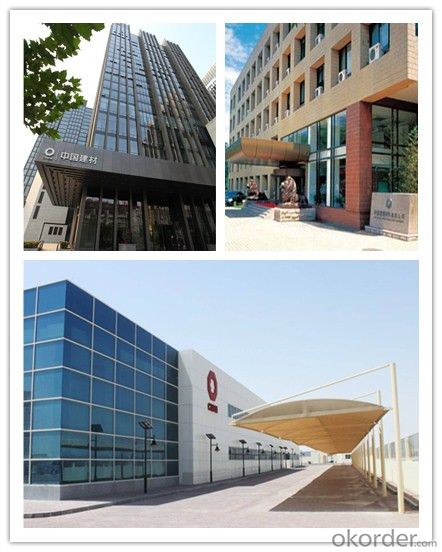
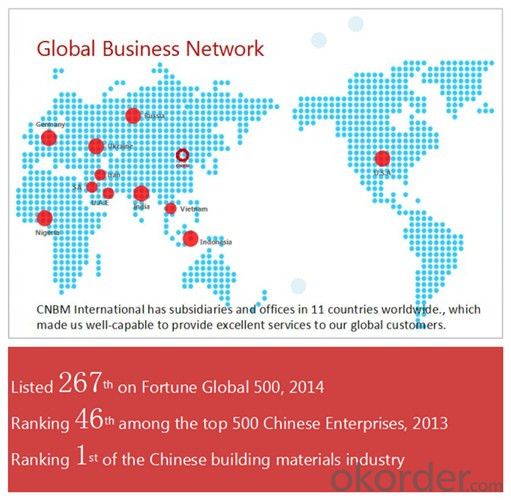
| After-sale service | CNBM provides the services and support you need for every step of our cooperation. We’re the business partners you can trust; you can relax and get on with doing business. |
| For any problem, please kindly contact us at any your convenient time, we’ll reply you in our first priority within 24 hours | |
| Advantages | Industry experience over 20 years. |
| Shipment of goods -More than 70 countries worldwide. | |
| The most convenient transport and prompt delivery. | |
| Competitive price with best service. | |
| High technical production line with top quality products. | |
| High reputation based on best quality products. |
Packaging & Delivery the Diameter 10mm AISI 304 Stainless Steel Wire Rod
| Packaging Detail | Sea worthy packing /as per customer's packing instruction |
| Delivery Detail | 15 ~ 40 days after receiving the deposit |
Products Show
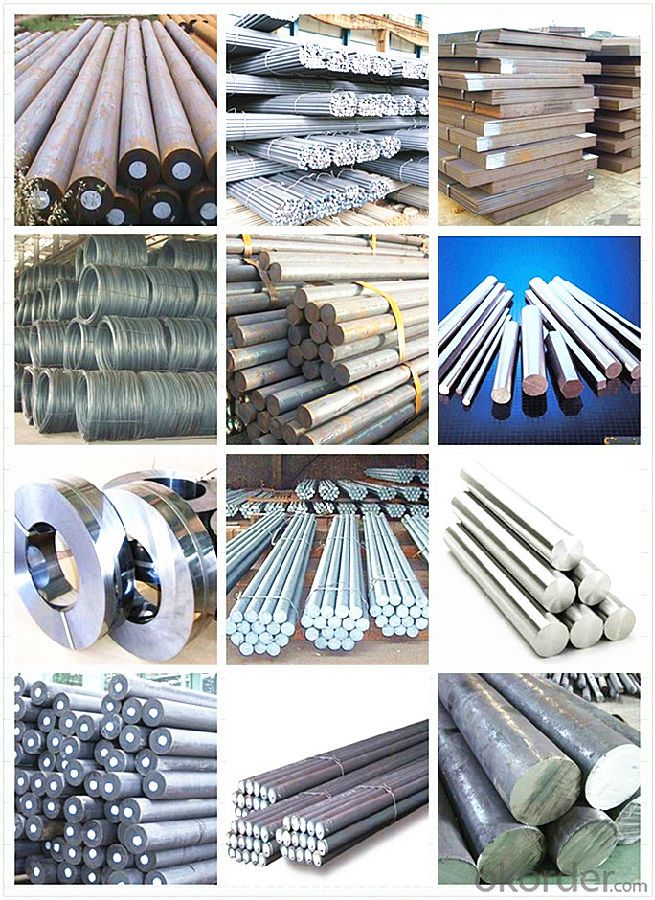
FAQ:
| Are you a trader or manufacturer? | Manufacturer |
| What’s the MOQ? | 3 metric ton |
| What’s your delivery time? | 15-35 days after downpayment received |
| Do you Accept OEM service? | Yes |
| what’s your delivery terms? | FOB/CFR/CIF |
| What's the Payment Terms? | 30% as deposit,70% before shipment by T/T |
| Western Union acceptable for small amount. | |
| L/C acceptable for large amount. | |
| Scrow ,Paybal,Alipay are also ok | |
| Why choose us? | Chose happens because of quality, then price, We can give you both. |
| Additionally, we can also offer professional products inquiry, products knowledge train (for agents), smooth goods delivery, excellent customer solution proposals. | |
| What's your available port of Shipment? | Main Port, China |
| What’s your featured services? | Our service formula: good quality+ good price+ good service=customer's trust |
| Where are your Market? | Covering more than 160 countries in the world |
- Q: What are the factors that determine the cost of special steel?
- There are several factors that determine the cost of special steel. These include the raw material costs, manufacturing processes and techniques involved, the complexity of the steel composition, the market demand and supply, and any additional treatments or finishes required. Other factors such as transportation costs, import/export taxes, and industry regulations may also influence the overall cost.
- Q: What are the different cutting tools used for special steel?
- For special steel applications, there exist various cutting tools commonly employed. These tools are specifically crafted to handle the distinct properties and characteristics of special steel, which often necessitate more precise and specialized cutting techniques. Some of the frequently used cutting tools for special steel include: 1. Saw blades with carbide tips: These blades possess carbide teeth, known for their exceptional hardness and durability. They effortlessly cut through special steel, providing clean and accurate cuts. 2. Cutting tools made of high-speed steel (HSS): HSS cutting tools are manufactured from a type of tool steel that can endure high temperatures while maintaining its hardness. These tools are commonly utilized for drilling, milling, and turning operations on special steel. 3. Cutting tools with diamonds: Diamonds are recognized as one of the hardest materials, making them ideal for cutting through tough materials like special steel. Diamond cutting tools, such as saw blades or grinding wheels coated with diamond, are commonly employed in special steel applications. 4. Machines utilizing waterjet cutting: Waterjet cutting machines utilize a high-pressure stream of water mixed with abrasive particles to cut through special steel. This method is particularly suitable for intricate designs and complex shapes. 5. Machines employing plasma cutting: Plasma cutting machines employ a high-velocity jet of ionized gas to cut through special steel. This method is frequently used for rapidly and efficiently cutting thick sections of special steel. 6. Machines utilizing laser cutting: Laser cutting machines employ a highly focused laser beam to cut through special steel. This method offers high precision and can be utilized for cutting complex shapes and patterns. To ensure the best cutting tool is selected for the job, it is crucial to choose the appropriate cutting tool based on the specific requirements of the special steel in question, as well as the desired cutting method and application. Seeking advice from a specialist or referring to the manufacturer's recommendations can help guarantee the optimal cutting tool is chosen.
- Q: Can special steel be used for medical applications?
- Yes, special steel can be used for medical applications. Specialized types of stainless steel, such as AISI 316L or 316LVM, are commonly used in medical devices and implants due to their excellent corrosion resistance, biocompatibility, and strength. These steels are often used in surgical instruments, orthopedic implants, cardiovascular devices, and many other medical applications.
- Q: How does special steel contribute to reducing product downtime?
- Special steel contributes to reducing product downtime by offering superior strength, durability, and corrosion resistance compared to regular steel. This allows for the manufacturing of high-performance components that can withstand harsh operating conditions, reducing the likelihood of breakdowns or failures. Additionally, special steel's enhanced wear resistance prolongs the lifespan of products, minimizing the need for frequent replacements or repairs. Overall, the use of special steel in various industries helps to ensure reliable and uninterrupted operation, leading to reduced downtime and increased productivity.
- Q: What is the significance of special steel in the medical field?
- Special steel is of great significance in the medical field due to its unique properties and characteristics. It is used to manufacture surgical instruments, implants, and medical devices that require high strength, corrosion resistance, and biocompatibility. Special steel ensures the safety and effectiveness of medical interventions, contributing to improved patient outcomes and overall healthcare advancements.
- Q: Can special steel be used for precision instruments?
- Yes, special steel can be used for precision instruments. Special steel, such as tool steel or stainless steel, offers excellent hardness, strength, and corrosion resistance, making it ideal for precision instruments that require high accuracy and durability.
- Q: What are the main advantages of using special steel in the mining industry?
- The main advantages of using special steel in the mining industry are its exceptional strength, durability, and resistance to wear and tear. Special steel can withstand the harsh conditions and extreme forces encountered in mining operations, ensuring the longevity of equipment and machinery. Additionally, its high resistance to corrosion and heat makes it ideal for mining processes involving chemicals and high temperatures. Overall, the use of special steel enhances the efficiency, safety, and productivity of mining operations.
- Q: What are the specific requirements for special steel used in the chemical reactor industry?
- The specific requirements for special steel used in the chemical reactor industry can vary depending on the specific application and the type of chemicals being processed. However, there are some general requirements that are typically expected for this type of steel. Firstly, the steel used in chemical reactors must have excellent corrosion resistance. Chemical reactors often handle highly corrosive substances, such as acids, alkalis, and other reactive chemicals. Therefore, the steel must be resistant to the corrosive effects of these substances to ensure the integrity and durability of the reactor. Secondly, the steel should have high temperature resistance. Chemical reactions often require high temperatures to facilitate the desired chemical transformations. The steel used in these reactors must be able to withstand these elevated temperatures without losing its structural integrity or undergoing any significant deformation. Furthermore, the steel should have good mechanical properties, including high strength and toughness. The reactor may experience high pressure and mechanical stress during operation, so the steel must be able to withstand these conditions without failure. Additionally, the steel used in chemical reactors should have good weldability and formability. This allows for ease of fabrication and construction of the reactor, ensuring a reliable and efficient manufacturing process. Moreover, the steel should have low levels of impurities, such as sulfur and phosphorus. These impurities can adversely affect the performance of the steel in terms of corrosion resistance and mechanical properties. Therefore, the steel must meet strict quality standards to ensure it is suitable for use in the chemical reactor industry. In summary, the specific requirements for special steel used in the chemical reactor industry include excellent corrosion resistance, high temperature resistance, good mechanical properties, weldability, formability, and low levels of impurities. Meeting these requirements is crucial to ensure the safety, reliability, and efficiency of chemical reactors in various industrial processes.
- Q: How is special steel used in the food processing industry?
- Special steel is used in the food processing industry for various applications such as manufacturing equipment, machinery, and tools. It is particularly utilized in the production of cutting blades, mixers, grinders, and other components that require high strength, durability, and resistance to corrosion. This type of steel ensures the hygienic processing of food products, maintains product quality, and meets the stringent safety standards required in the industry.
- Q: How does special steel contribute to the construction equipment industry?
- The construction equipment industry heavily relies on special steel to ensure the necessary strength, durability, and resistance to wear and tear in their heavy-duty equipment. Extreme conditions, including heavy loads, harsh environments, and constant use, demand the use of special steel alloys that are specifically designed to withstand these challenges and guarantee the equipment's longevity and reliability. One of the major contributions of special steel to the construction equipment industry lies in its impressive strength-to-weight ratio. This characteristic allows manufacturers to design and produce equipment that is both robust and lightweight. Implementing special steel in the construction of crucial equipment components such as chassis, booms, buckets, and blades enhances their load-carrying capacity and overall performance. Additionally, special steel offers exceptional corrosion resistance, which is a significant advantage in construction sites where equipment is exposed to moisture, chemicals, and other corrosive substances. By utilizing corrosion-resistant special steel alloys, manufacturers can extend the lifespan of construction equipment and reduce maintenance costs. Moreover, special steel plays a vital role in providing superior wear resistance. The abrasive materials encountered in construction sites, such as rocks, gravel, and concrete, can cause significant wear on equipment components. Special steel alloys with high hardness and wear resistance properties help minimize wear and prolong the service life of the equipment, reducing the need for frequent replacements and downtime. Furthermore, special steel enables the construction equipment industry to meet specific performance requirements. Various types of special steel alloys can be tailored to meet specific needs, such as impact resistance, high-temperature resistance, or low-temperature toughness. This versatility allows manufacturers to produce equipment that can efficiently operate in diverse conditions, ultimately enhancing the industry's overall productivity. In conclusion, special steel plays a crucial role in the construction equipment industry by providing the necessary strength, durability, resistance to wear and tear, and customization options. By incorporating special steel alloys into their manufacturing processes, equipment manufacturers can produce high-quality machinery that meets the demanding requirements of construction sites, thus improving productivity, safety, and efficiency within the industry.
Send your message to us
Diameter 10mm AISI 304 Stainless Steel Wire Rod
- Loading Port:
- Tianjin
- Payment Terms:
- TT OR LC
- Min Order Qty:
- 1 m.t.
- Supply Capability:
- 10000 m.t./month
OKorder Service Pledge
Quality Product, Order Online Tracking, Timely Delivery
OKorder Financial Service
Credit Rating, Credit Services, Credit Purchasing
Similar products
Hot products
Hot Searches
Related keywords
